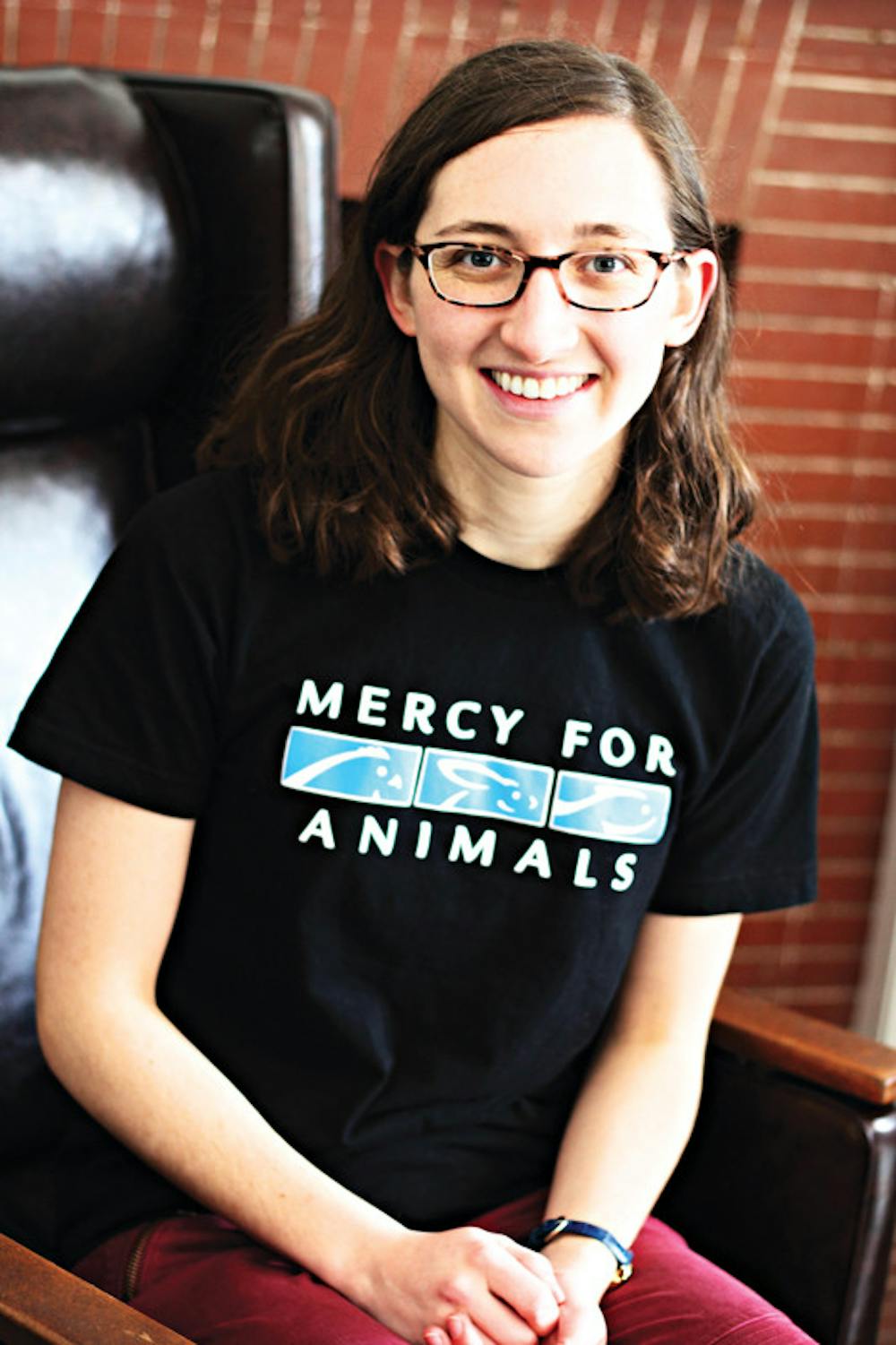If Lauren Pierce ’15 gets her way, daily hamburgers at the Sharpe Refectory will soon be a thing of the past. Pierce’s passion for animal rights led her to apply for a fellowship with Mercy for Animals, a nonprofit that advocates just treatment of farm animals and promotes vegetarianism and veganism. As one of 10 fellows nationally, Pierce hopes to influence her peers to join the fight for animal rights and make dietary choices that will better the lives of farm animals.
Pierce is joined by one fellow each from Stanford University, the Massachusetts Institute of Technology and all eight Ivy League schools, MFA created the fellowship “to spread awareness about the many negative impacts of factory farming on the animals, the environment and on our health, and to compel people to make more compassionate, healthy food choices by choosing vegetarian food,” said Alan Darer, education project coordinator at MFA.
MFA targeted undergraduate and graduate students at highly selective institutions because it “wanted to choose people who have influence,” Darer said. “Those people are able to influence others to make similar choices.”
Pierce heard about the fellowship through a colleague at the Humane Society of the United States, where she interned last summer, specializing in farm animal protection, she said.
While Pierce is currently Brown’s only MFA fellow, Darer said he is interested in hiring a second fellow at each school. Though the number of fellows may increase at each school, the number of institutions in the fellowship will not expand beyond the original 10.
Fellows are required to work for 40 hours over the course of the semester — averaging about three hours per week — and are provided a $500 stipend, Darer said.
The 10 fellows collaborate online using a private Facebook page, where they can post images of successful campaigns, ask questions and give advice, Darer said. Once a week, fellows can call in to a conference line to collaborate in real time on their ongoing projects, he added.
The fellowship officially began with the start of the spring semester, but a test of the program ran last semester at all participating schools except Princeton and Cornell. Last fall, fellows reached more than 15,000 students with MFA’s message, Darer added.
Pierce handed out nearly 3,000 booklets last fall with information about factory farming — enough for almost half of the undergraduate population, she said. “Studies show that about half of students who see these booklets make a change to their diets,” Pierce said. “I feel like that actually made an impact.”
Pierce also placed a few hundred stacks of MFA literature around campus and screened an animal rights documentary that attracted a large audience, she said.
MFA’s work stretches beyond the boundaries of animal rights, as the organization also supports efforts to curb global warming as well, Pierce said.
“In the larger context, I think animal rights is extremely important, because factory farming is a large contributor to greenhouse gases and deforestation,” Pierce said, adding that “meat consumption is a large contributor to global starvation and malnutrition.”
“Animal rights has a large opportunity for solving global problems,” she said.
Brown students are open-minded and receptive to the ideas of MFA, Pierce said, adding that there are already a lot of vegetarians and vegans on campus.
The Brown Vegetarian Society is partnering with Pierce to create a guide to becoming vegetarian or vegan at Brown, said Adam Horowitz ’16, president of the Brown Vegetarian Society. The guide will ideally include the best vegetarian and vegan options at on-campus eateries and local restaurants, he said.
The causes that Brown Vegetarian Society and MFA advocate are “pretty much the same: that we should not be eating animals from an ethical, environmental and health perspective,” Horowitz added.
On March 3, Pierce will screen the film “Forks Over Knives,” which argues that there is a direct link between many modern diseases and diet, she said.
This semester, Pierce will focus less on leafleting and more on asking students to pledge to observe Meatless Mondays, she said. By the end of the Mid-Year Activities Fair, she had gathered about 100 pledges.
Pierce hopes to see the dining halls adopt Meatless Mondays. “Just cutting out meat options one day a week isn’t that hard,” she said, adding that the University could save money by substituting cheaper options such as rice and pasta for meat, which is relatively expensive.
“This would be a great way for (Brown Dining Services) to get more involved with the campus initiative of being more environmentally and socially conscious,” she added.
Many other universities have taken the pledge to serve entirely meatless options one day a week. One hundred forty-nine colleges across the country, including Columbia, have implemented the day on campus, according to Meatless Monday, a nonprofit that aims to reduce the nation’s meat consumption and promote public health.
Pierce recognizes the difficulty of instituting structural change at Brown, which is why she is focusing on changes at an individual level. “Me being one person, I have more of an impact reaching out to individual people,” she said. She plans to station a table at the Ratty every Monday where she can gather student pledges.
Many underclassmen with similar passions have approached Pierce with the desire to get involved in her project. Pierce has also encouraged student activists she has worked with to apply for the fellowship.
“Applying for the MFA fellowship next year is something I’m definitely considering,” said Christian Suarez ’18, who has been involved with Pierce’s initiatives since he attended her screening of “Cowspiracy” last semester. “I’d be able to take on a bigger role in terms of on-campus activism and gaining important experience relevant to animal rights.”
By choosing to eat vegetarian or vegan, students can significantly ameliorate the lives of animals, Darer said, adding that each vegetarian saves the lives of 30 land animals per year.
The movement to reduce meat consumption is surging forward, Darer said, adding that “the ones leading this movement are students.”





